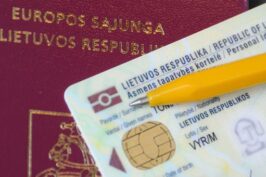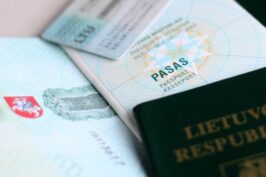- Home
- 2016 06 23 The Jews (Litvaks) and other emigrants who left Lithuania during the interwar period and their descendants will be able to reinstate Lithuanian citizenship or acquire double citizenship without bureaucratic obstacles
2016 06 23 The Jews (Litvaks) and other emigrants who left Lithuania during the interwar period and their descendants will be able to reinstate Lithuanian citizenship or acquire double citizenship without bureaucratic obstacles


On 23 June, 2016 Lithuanian Seimas adopted amendments to the Law on Citizenship which will ensure the right of Jews (Litvaks) who left Lithuania during the interwar period, as well as other emigrants and their descendants to reinstate Lithuanian citizenship. Initiation and adoption of these amendments was stimulated by the practice formed by the Migration Department, according to which the Migration Department used to require Lithuanian Jews (Litvaks) who themselves or their ancestors left Lithuania before 1940, to provide evidence proving that they had left Lithuania due to the actual threat, political or historical reasons, resistance to the occupation regime or persecution. Such documents were extremely difficult to provide, so as the result, many Lithuanian Jews (Litvaks) could not have Lithuanian citizenship reinstated. Because of the formed practice they could not acquire a double citizenship, even though the law provides such a possibility. This practice created a problem not only to a numerous community of Litvaks in Israel, South Africa and other countries, but also to all Lithuanian emigrants and their descendants who left Lithuania before the year 1940, even though they had a right to a double citizenship according to the valid law which was adopted in the year 2011.
Up to now the Law on Citizenship established that a person who left Lithuania before 11 March, 1990, a person or his descendant who had Lithuanian citizenship before 15 June, 1940, persons who left the current Lithuanian territory for permanent residence in other country before 11 March, 1990, if on 11 March, 1990 their permanent place of residence was not Lithuania.
In the cases of reinstitution of Lithuanian citizenship or acquisition of double citizenship, the practice of the Migration Department was based on the practice formed by the Lithuanian courts according to which a person who left Lithuania before 11 March, 1990 is a person who had Lithuanian citizenship before 15 June, 1940 and left Lithuania before 11 March, 1990 due to historical or political motives, such as resistance to occupation regime or prosecution of occupation regime due to religion, origin, political opinion or membership in a particular social group who could not or was afraid to come back to Lithuania, or descendant of such person. In the practice of Lithuanian courts this “leaving” of Lithuania is explained as departure from Lithuania due to a certain threat to a person. This threat is usually associated with presupposed restrictions of the occupation regime which by their nature are serious enough to threaten the fundamental human rights. Based on this interpretation, persons who left Lithuania in during the period of 1919-1940 or their descendants were not covered by the concept of a person who left Lithuania before 11 March, 1990, as according to the Lithuanian courts during the period of 1918-1940 Lithuanian citizens were not prosecuted. Recently such persons could not have Lithuanian citizenship reinstated and they did not qualify for dual citizenship.
According to the amendments to the Law on Citizenship adopted by Lithuanian Seimas a person who left Lithuania a person who left Lithuania before 11 March, 1990, a person or his descendant who had Lithuanian citizenship before 15 June, 1940, persons who left the current Lithuanian territory for permanent residence in other country before 11 March, 1990, if on 11 March, 1990 their permanent place of residence was not Lithuania. This term does not include persons, who departed from Lithuania to the territory of the former Soviet Union after 15 June, 1940. The Law on Lithuanian Citizenship covers both leaving and departure of a person.
The amendments to the Law on Lithuanian Citizenship adopted by Lithuanian Seimas will enter into force when they are signed by the Lithuanian President.
MIGRATION LAW CENTER






























